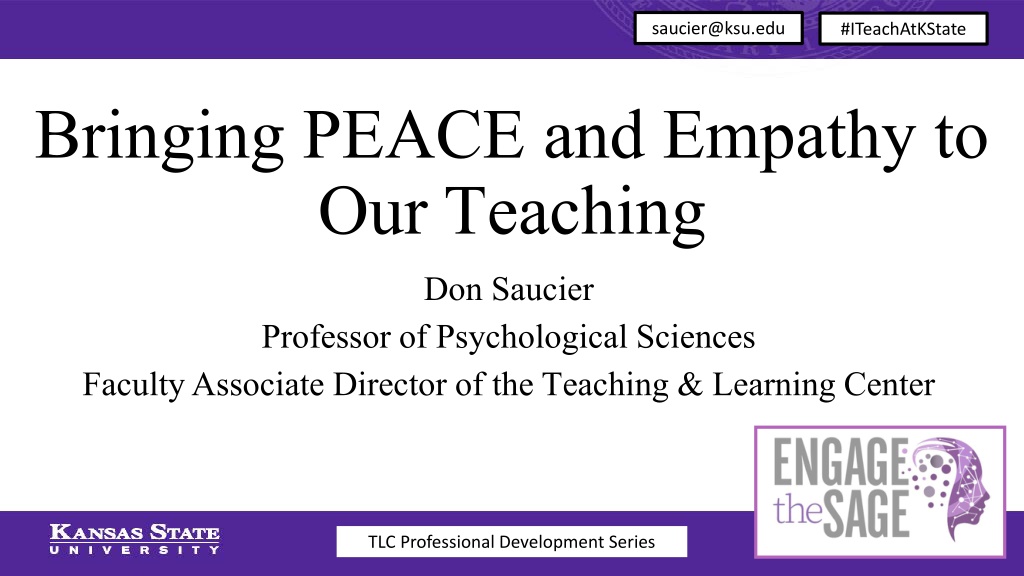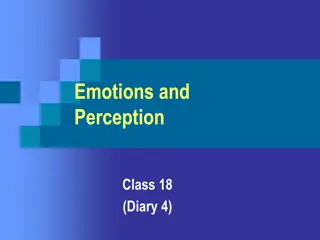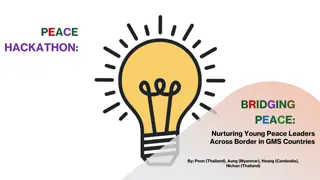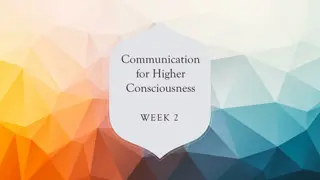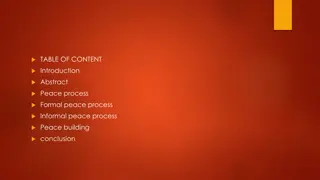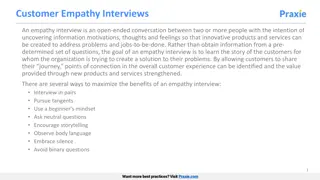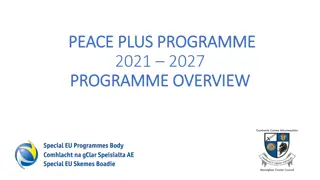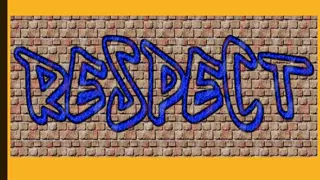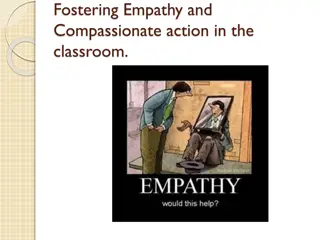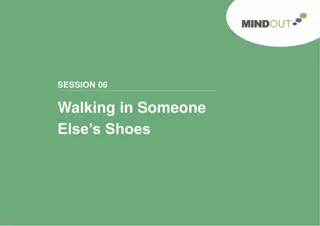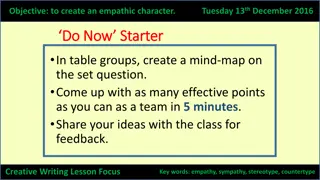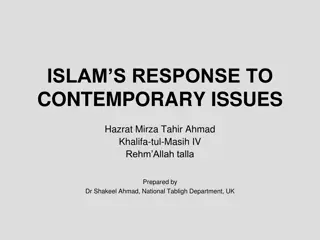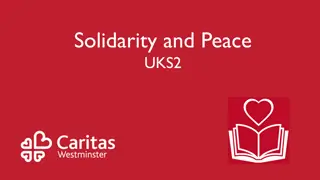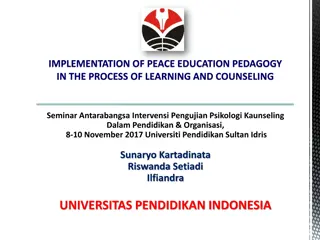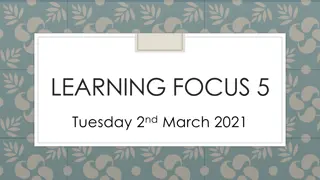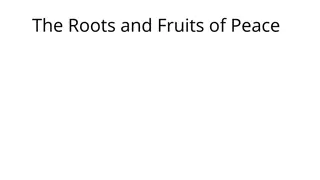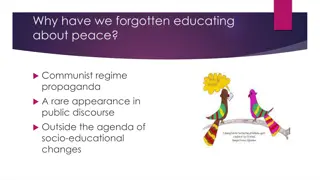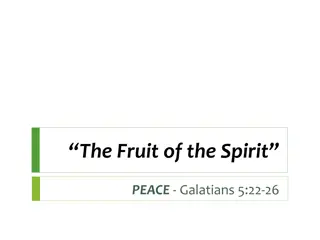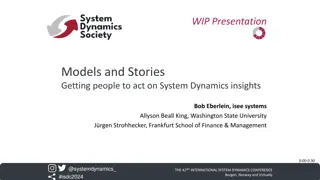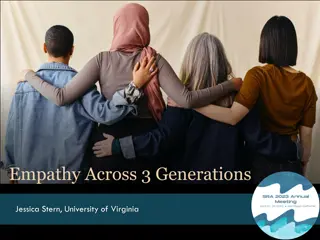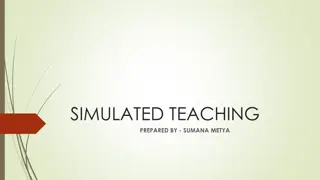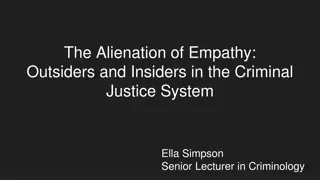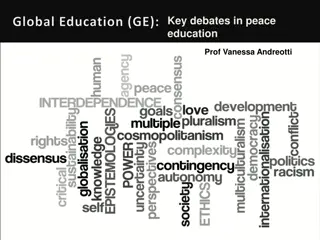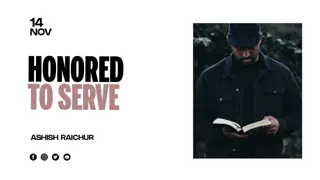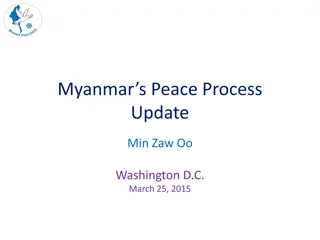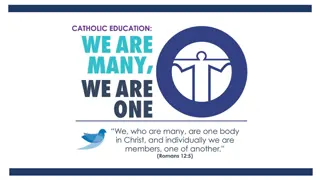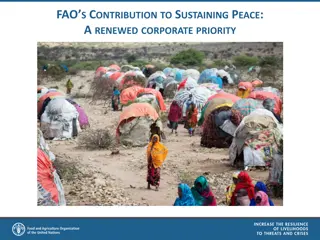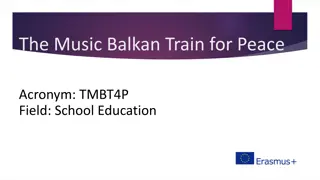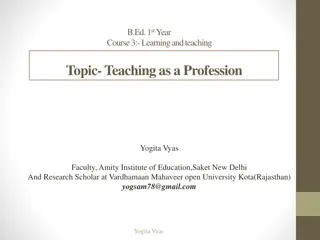Bringing Peace and Empathy to Teaching: Insights from Don Saucier at K-State
Don Saucier, a Professor of Psychological Sciences at K-State, emphasizes infusing peace and empathy into teaching for a better learning experience. This session explores practical strategies for promoting empathy in various teaching formats, acknowledging challenges, and offering valuable resources for educators. Saucier's approach underscores how teachers' perspectives shape the learning environment and the importance of self-awareness in teaching practices.
Download Presentation

Please find below an Image/Link to download the presentation.
The content on the website is provided AS IS for your information and personal use only. It may not be sold, licensed, or shared on other websites without obtaining consent from the author. Download presentation by click this link. If you encounter any issues during the download, it is possible that the publisher has removed the file from their server.
E N D
Presentation Transcript
saucier@ksu.edu #ITeachAtKState Bringing PEACE and Empathy to Our Teaching Don Saucier Professor of Psychological Sciences Faculty Associate Director of the Teaching & Learning Center TLC Professional Development Series
saucier@ksu.edu #ITeachAtKState What Do You Hope to Take Away? What is one thing you want to learn in this session today? Please type that take away into the chat
saucier@ksu.edu #ITeachAtKState What I Hope You Take Away Practical ways to infuse PEACE and empathy into our teaching to promote better experiences for us and our students Face-to-face, hybrid/hyflex, and/or online
saucier@ksu.edu #ITeachAtKState Disclaimers Disclaimer #1 Not everything will work in every class! Disclaimer #2 I have a lot to share today! Check out our resources
saucier@ksu.edu #ITeachAtKState Resources Engage the Sage YouTube channel Mindful Returns Toolkit K-State Keep Teaching website Remote Teaching Training Schedule Keep Teaching: Resources for Higher Ed online community Faculty Checklist in Preparation for Remote Teaching Videos for Faculty Tips for Teaching Remotely Options for Teaching Lab Courses Remotely Teaching & Learning Center social media will highlight information Facebook, Twitter
saucier@ksu.edu #ITeachAtKState Teaching Starts with Teachers Our personas and perspectives provide the foundations for teaching and learning dictate our teaching philosophy and practices are intentional, purposeful, and dynamic
saucier@ksu.edu #ITeachAtKState Teaching Starts with Teachers Trickle Down Engagement Engage the Sage We should focus on our own experience first
saucier@ksu.edu #ITeachAtKState We Have Challenges Right Now!
saucier@ksu.edu #ITeachAtKState Bring PEACE to Our Teaching P = E = A = C = E = Preparation Expertise Authenticity Caring Engagement
saucier@ksu.edu #ITeachAtKState Empathy Perspective taking Empathic concern To promote our collective experiences, we should consider our and our students cognitive and emotional perspectives
saucier@ksu.edu #ITeachAtKState Empathetic Course Design Perspective We value and care for ourselves and our students We believe that empathy is more important than academic rigor We provide flexibility, guidance, and grace
saucier@ksu.edu #ITeachAtKState Empathetic Course Design Perspective We inclusively promote, and remove barriers to, student learning We make our expectations clear and reasonable For our students and ourselves We make the reasons for our practices explicit
saucier@ksu.edu #ITeachAtKState Empathetic Course Design Perspective We provide fair and reasonable ways for students to demonstrate their learning We seek and use feedback from our students
saucier@ksu.edu #ITeachAtKState Empathetic Course Design in Practice Syllabus statements Course scheduling Course structure Course policies Assignments and assessments Being there for our students
saucier@ksu.edu #ITeachAtKState Empathetic Syllabus Statements Syllabus statements make our teaching philosophies explicit and set the climate for our courses Empathy statement Mutual respect and inclusion statement Mental health statement
saucier@ksu.edu #ITeachAtKState Empathy Statement Things are different now (during the COVID-19 pandemic) than they were. This is very real for all of us. The social distancing and transition to remote education is tough, and frankly it sucks. We are teaching differently and under different circumstances than we were, and you are learning differently and under different circumstances than you were. Please keep connected with us. If you have difficulty with the course content, assignments, deadlines, etc., please reach out and we will try to work with you as best we can. We want you to learn and succeed. We want to have a wonderful experience learning with you. We should be creating physical distance right now, not social We should be creating physical distance right now, not social distance. We are here for you. distance. We are here for you.
saucier@ksu.edu #ITeachAtKState Mutual Respect and Inclusion in K-State Teaching and Learning Spaces At K-State, faculty and staff are committed to creating and maintaining an inclusive and supportive learning environment for students from diverse backgrounds and perspectives. K-State courses, labs, and other virtual and physical learning spaces promote equitable opportunity to learn, participate, contribute, and succeed, regardless of age, race, color, ethnicity, nationality, genetic information, ancestry, disability, socioeconomic status, military or veteran status, immigration status, Indigenous identity, gender identity, gender expression, sexuality, religion, culture, as well as other social identities. Faculty and staff are committed to promoting equity and believe the success of an inclusive learning environment relies on the participation, support, and understanding of all students. Students are encouraged to share their views and lived experiences as they relate to the course or their course experience, while recognizing they are doing so in a learning environment in which all are expected to engage with respect to honor the rights, safety, and dignity of others in keeping with the K-State Principles of Community https://www.k-state.edu/about/values/community/. If you feel uncomfortable because of comments or behavior encountered in this class, you may bring it to the attention of your instructor, advisors, and/or mentors. If you have questions about how to proceed with a confidential process to resolve concerns, please contact the Student Ombudsperson Office. Violations of the student code of conduct can be reported here https://www.k-state.edu/sga/judicial/student-code-of-conduct.html. If you experience bias or discrimination, it can be reported here https://www.k-state.edu/report/discrimination/.
saucier@ksu.edu #ITeachAtKState Mental Health Statement Your mental health and good relationships are vital to your overall well-being. Symptoms of mental health issues may include excessive sadness or worry, thoughts of death or self-harm, inability to concentrate, lack of motivation, or substance abuse. Although problems can occur anytime for anyone, you should pay extra attention to your mental health if you are feeling academic or financial stress, discrimination, or have experienced a traumatic event, such as loss of a friend or family member, sexual assault or other physical or emotional abuse. If you are struggling with these issues, do not wait to seek assistance. Kansas State University Counseling Services (k-state.edu/counseling/) offers free and confidential services to assist you to meet these challenges. Lafene Health Center (https://www.k-state.edu/lafene) has specialized nurse practitioners to assist with mental health. The Office of Student Life (k-state.edu/studentlife) can direct you to additional resources. K-State Family Center offers individual, couple, and family counseling services on a sliding fee scale (https://www.hhs.k-state.edu/familycenter/). Center for Advocacy, Response, and Education (CARE) provides free and confidential assistance for those in our K-State community who have been victimized by violence (https://www.k-state.edu/care/).
saucier@ksu.edu #ITeachAtKState Empathetic Course Scheduling Provide support and reduce stress by increasing students abilities to predict and control Set up explicit weekly routines (to do lists) Proactively schedule mental health days, prep days, catch up, and/or reading days Beware of end of the semester build up
saucier@ksu.edu #ITeachAtKState Empathetic Course Structure Teach our students where they are Hyflex, post videos for asynchronous viewing Have (some) synchronous contact Invite our students to keep their videos on
saucier@ksu.edu #ITeachAtKState Zoom Policy Statement For classes that you attend synchronously over Zoom, we expect you will attend with your video on. This will make it easier for us to connect to you and gauge your understanding while we teach. This will also make it easier for you to pay attention and be less distracted by other things. In short, if you attend with your video on, you will engage more in the class, learn more, and help us teach you better. We understand that you may be unable to attend with your video on for a given class for whatever reason just please let us know.
saucier@ksu.edu #ITeachAtKState Empathetic Course Policies Empathetic late policies Empathetic attendance policies Choice to Learn framing Offer opportunities (not requirements ) Emphasize earning (not losing ) points
saucier@ksu.edu #ITeachAtKState Empathetic Course Assignments/Assessments Understand that everything we assign will come back to us Provide assignments students will want to do and we will want to grade Provide opportunities for students to apply and extend their learning in meaningful ways
saucier@ksu.edu #ITeachAtKState Empathetic Course Assignments/Assessments Consider lower stakes assignments Beware of comprehensive assessment Offer students choices in assignments What, when, and/or how Beware of group work and projects Get the maximum out of our students
saucier@ksu.edu #ITeachAtKState Empathetic Course Assignments/Assessments Reflections (important/surprising/Q) Because You Asked Weekly Missions Homework for Life PSAs Allow students to create and complete their own assignments and assessments (and even exams) Exams By You
saucier@ksu.edu #ITeachAtKState Empathetic Exams If we use more traditional exams: Understand the limits of remote proctoring Allow resources Prepare our students for the experience Be clear about what is allowed See the recent statement about Honor and Integrity
saucier@ksu.edu #ITeachAtKState Being There for Our Students Focus on building connections and community Genuinely care about and empathize with our students experiences Create frequent touch points Pandemic nicknames to start class
saucier@ksu.edu #ITeachAtKState Being There for Our Students Provide regular announcements/to do lists Respond to weekly reflections Survey our students About their course experiences About internet availability, food/housing security, etc. Provide resources for mental health and physical health concerns often
saucier@ksu.edu #ITeachAtKState Being There for Our Students Provide opportunities for synchronous contact Conduct Highlights and Qs sessions Provide How to Succeed guides/videos
saucier@ksu.edu #ITeachAtKState Being There for Yourself Design our courses while anticipating the workload we are putting on ourselves Understand that we all have limits Time, emotional energy, competing responsibilities Design our courses to be fulfilling for us Ask our students what they learned as a waterfall exit ticket in each class Top Things Learned as a concluding assignment
saucier@ksu.edu #ITeachAtKState In Conclusion Bringing PEACE and empathy to our teaching Will promote more successful and fulfilling experiences in teaching and learning for our students and for us
saucier@ksu.edu #ITeachAtKState What Will You Take Away? What is one concrete way in which you will infuse PEACE and empathy into your current or future teaching? Please type your answer into the chat Don t press return until I say to waterfall you answers into the chat!
saucier@ksu.edu #ITeachAtKState What Questions Do You Have? Further questions and/or the PPT of this presentation: Email Don Saucier at saucier@ksu.edu Thank you!
